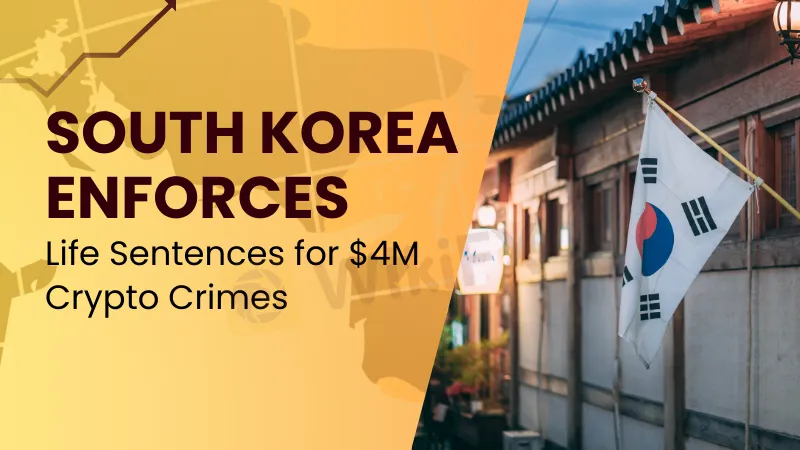South Korea Enforces Life Sentences for $4M Crypto Crimes
Abstract:South Korea enforces life sentences for $4M crypto crimes as part of new regulations to safeguard the digital asset market under the Virtual Asset Users Protection Act.

South Korea has made strict efforts to combat unlawful cryptocurrency activity. Individuals convicted of crypto crimes worth more than $4 million (5 billion won) now face life imprisonment. This decision comes after implementing the Virtual Asset Users Protection Act, which intended to strengthen monitoring and provide a safe environment for digital asset transactions.
Increasing Regulatory Scrutiny in South Korea's Crypto Market

The Financial Supervisory Service (FSS), under Chief Lee Bok-hyun, has increased its monitoring of the virtual asset market. Speaking to CEOs from 16 cryptocurrency companies, Lee stressed the government's determination to enforce the Virtual Asset Users Protection Act, which went into effect on July 19, 2024.
The FSS has underlined its zero-tolerance approach to unlawful cryptocurrency transactions. If fraudulent acts are detected, all investigative resources will be focused on ensuring compliance and pursuing offenders. Monitoring market volatility and limiting the dissemination of incorrect information, especially regarding newly listed cryptocurrencies, are priority concerns for the FSS.
Stricter Inspections and Continuous Regulatory Changes
The FSS has previously declared preparations to investigate two bitcoin exchanges where strange trading patterns were discovered. In addition, three additional exchanges and a wallet provider will be subjected to frequent inspections to guarantee compliance with new legislation.
Lee Bok-hyun also hinted at possible changes to current law, indicating the prospect of a “second phase” of regulatory reforms. Close interaction with companies and related authorities will be critical as the government develops a more rigorous framework for managing virtual assets.
Origins of the Virtual Asset Users Protection Act
The Virtual Asset Users Protection Act arose from the disastrous aftermath of Terraform Labs, a South Korean blockchain business, failing in May 2022. This episode resulted in worldwide market losses of more than $450 billion, spurring urgent legislative action to rectify regulatory weaknesses and protect investors.
Under the new regulatory framework, bitcoin exchanges must now create sophisticated monitoring systems to identify illicit behavior. The new laws also ban market manipulation, insider trading, and other unfair acts, and individuals who participate in such behavior face harsh penalties.
Stronger Monitoring Systems for Exchanges
Industry experts have emphasized the relevance of the “order book information loading system,” which the new regulation requires. This approach guarantees that bitcoin exchanges keep complete records of all trading operations, enabling regulators to discover and respond to situations of unfair trading practices.
South Korea's implementation of these stringent regulations demonstrates its intention to build a safer and more transparent virtual asset market, providing better security to investors and discouraging prospective scammers.
A Firm Position on Crypto Crimes
South Korea's recently implemented legislation constitutes one of the world's most stringent responses to cryptocurrency crimes. The prospect of life sentences for offenders highlights the government's determination to address the rising hazards in the digital asset market. The new regulations are anticipated to transform how cryptocurrency firms operate in the nation, with the ultimate objective of creating a more secure financial environment for all stakeholders.
Stay updated on South Korea's crackdown on crypto crimes and new regulations. Visit the WikiFX news page for the latest insights into the virtual asset market

Read more

Malaysian Influencer Detained in Taiwan Over Alleged Role in Fraud Scheme
Malaysian influencer Hu Chang Mun, widely known as Ady Hu, has been detained in Taiwan for his alleged involvement in a fraudulent operation. The 31-year-old, who was reported missing earlier in December, was located by Taiwanese authorities after suspicions arose regarding his activities.

Couple Arrested in Songkhla for 800M Baht Investment Scams
Authorities in Thailand have apprehended a Malaysian man and his Thai wife for their alleged involvement in a series of fraudulent investment schemes that inflicted financial damage amounting to 800 million baht.

MultiBank Group Wins Big at Traders Fair Hong Kong 2024
Discover how MultiBank Group, a global leader in financial derivatives, secured three prestigious awards at Traders Fair Hong Kong 2024, highlighting its innovative trading solutions and industry excellence.

CySEC Settles Compliance Case with Fxview Operator Charlgate Ltd
Discover how CySEC resolved compliance issues with Charlgate Ltd, the operator of Fxview, through a €50,000 settlement. Explore the investigation, regulatory measures, and CySEC's new website designed for improved accessibility and transparency.
WikiFX Broker
Latest News
Geopolitical Events: What They Are & Their Impact?
Volkswagen agrees deal to avoid Germany plant closures
Top 10 Trading Indicators Every Forex Trader Should Know
TradingView Launches Liquidity Analysis Tool DEX Screener
MultiBank Group Wins Big at Traders Fair Hong Kong 2024
WikiEXPO Global Expert Interview: Simone Martin—— Exploring Financial Regulation Change
'Young investors make investment decisions impulsively to keep up with current trends' FCA Reveals
Why Do You Feel Scared During Trade Execution?
CySEC Settles Compliance Case with Fxview Operator Charlgate Ltd
Malaysian Influencer Detained in Taiwan Over Alleged Role in Fraud Scheme
Rate Calc
